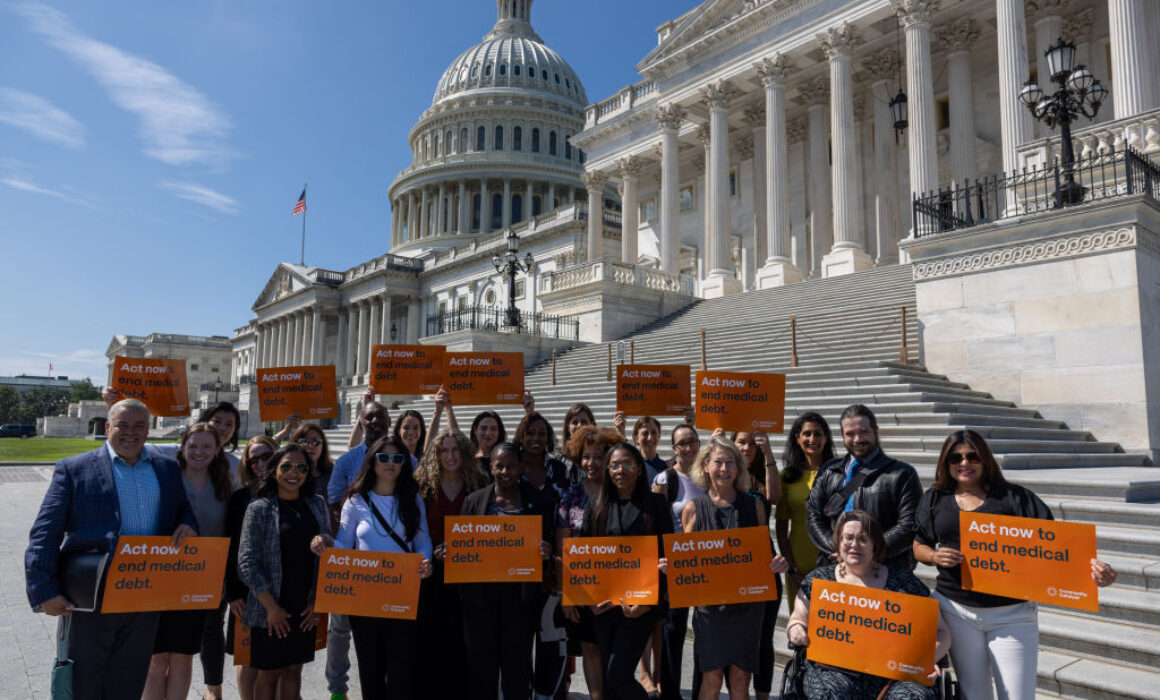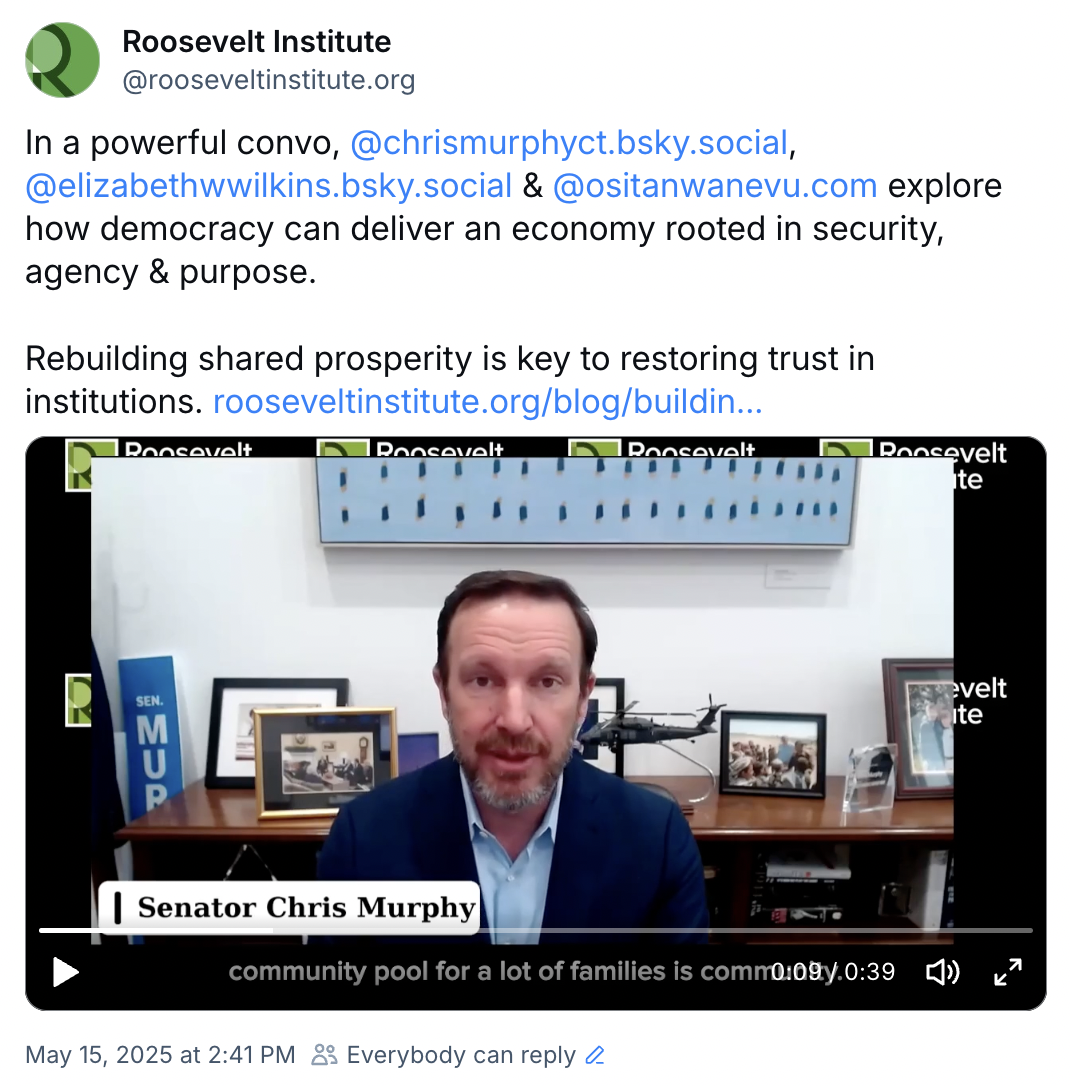The Medical Debt Crisis Is a Policy Choice
May 16, 2025

Health advocates and community members gather in Washington, DC, to push the federal government to take action on medical debt. (Tasos Katopodis/Getty Images for Community Catalyst)
The Costs of Insufficient Insurance Coverage
Whether they owe providers directly or carry the financial burden in long-term loans and credit card bills, an estimated 41 percent of Americans hold some form of medical debt.
“Medical debt is not inevitable. Rather, it is the product of decades of dysfunctional health-care policy, a market-oriented insurance system, and a patchwork of safety net programs with notable gaps,” writes Stephen Nuñez, Roosevelt’s director of stratification economics, in a new brief.
Health-care policy permeates every stage of American life—whether it’s students applying for Medicaid, workers struggling to find insurance coverage between jobs, or the elderly signing up for Medicare—and the scale of the resulting debt crisis is massive. But these problems are also solvable.
“Biden administration efforts over the past several years have shown that our health-care system can be strengthened to extend insurance to millions more working-class people and help millions more upgrade their insurance coverage with better plans, at incrementally small costs,” Nuñez explains. “But the Trump administration is now poised not only to undo these steps but to enact savage cuts to federal health-care spending that will supercharge the medical debt crisis and together leave millions of people, disproportionately Black and Hispanic, uninsured and underinsured.”
Ultimately, a crisis created by policy choices must also be solved by policy choices:
- In 2025, Congress should protect Medicaid and the American Rescue Plan tax credits.
- In upcoming state legislative sessions, the 10 states withholding federal Medicaid funds from their residents should expand coverage as stipulated in the Affordable Care Act.
- In the coming years, the federal government should implement a comprehensive plan to close the gaps in the American health insurance system.
Read the full brief: “The US Medical Debt Crisis: Catastrophic Costs of Insufficient Health Coverage”
The Key Barrier to Abundance: Concentrated Corporate Power
As the abundance debate percolates through the national conversation, Roosevelt President and CEO Elizabeth Wilkins joined The Realignment podcast to discuss state capacity and “naming the villain.”
Wilkins agrees with plenty of the symptoms that abundance advocates highlight: “The government institutions that we have now, in 2025, are not the government institutions that we had for much of the 20th century, certainly after the New Deal, that were capable of putting in a national highway system, of building decent public housing, and . . . shaping markets to make sure that they were competitive and that they delivered for people.”
But she thinks that pointing the finger at well-intentioned but ultimately stifling left-wing regulatory frameworks misses half the story. “There’s a significant conservative movement that’s interested in hamstringing government, and there are really significant concentrated corporate interests that are on the side of hamstringing government as well,” Wilkins says. “And if we only tell half the story, we’ll only get to half the solution.”
Achieving abundance will require an honest reckoning with who benefits from and who is harmed by the current system. As Wilkins puts it, “I find urgency in the fact that we have failed a whole swath of human beings in the United States despite the amount of wealth that we have here.”
Ultimately, those same people who have been harmed should be empowered to advocate for change: “A major solution is not just the ability of the state to regulate corporate power, but it is also the ability of people to organize countervailing power and to craft agency in their work life and in their communities.”
Listen to the full conversation: “Elizabeth Wilkins: Abundance and the Left, Antitrust & the Future of State Capacity”
What We’re Talking About
What We’re Reading
- Roosevelt Principal Economist Michael Madowitz talked to Business Insider about contractions in consumer spending: “Even if it’s just people deciding to wait a few months to buy something, that can have pretty big impacts pretty quickly.”
- Looking at the likely effects of the brewing trade war, Madowitz told the New Republic, “There is a 50 percent chance we have some kind of slowdown; 50 percent chance we have a recession, hypothetically.”
- Republicans have outlined a proposal called “MAGA Accounts,” a regressive onetime deposit of $1,000 that “will not redress the gross inequities around wealth that we experience in our country,” Roosevelt Senior Fellow Darrick Hamilton told MarketWatch.
- A better path? “Baby Bonds,” a proposal by Hamilton and Roosevelt Senior Fellow William Darity Jr. that would actually narrow the racial wealth gap.
